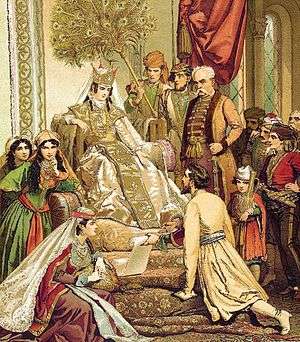Kubasar
Kubasar or Qubasar (Georgian: ყუბასარი) was the 12th-century Georgian politician. A Georgianized Kipchak, his ancestry traced to those Turkic tribesmen from the North Caucasus steppes who had been settled in Georgia under King David IV (c. 1089-1125). In sharp contrast to old, frequently rebellious Georgian feudal lords, Qubasar represented ennobled commoners and military servicemen, who gained distinction through their loyalty to the King George III (c. 1156-1184) whom Qubasar served as a Amirspasalar ("constable"), a post he held upon Queen Tamar’s ascend to the throne in 1184.
History
In 1177, George III, was confronted by a rebellious faction of nobles. The rebels intended to dethrone George in favor of the king's fraternal nephew, Demna, who was considered by many to be a legitimate royal heir of his murdered father, David V. Demna's cause was little but a pretext for the nobles, led by the pretender's father-in-law, the amirspasalar Ivane Orbeli, the viceroy of Ani and the head of the powerful and ambitious Orbeli clan, to weaken the crown.[1] The insurgents crowned Demna the king at the Agara Castle and marched, with 30,000 men, to the Georgian capital of Tbilisi. George was saved by the Kipchak Qubasar and the latter was now elevated to the office of Amirspasalar, receiving many of Ivane Orbeli's very considerable land holdings as well.
Once the rebellion was suppressed and the pretender eliminated, George went ahead to co-opt Tamar into government with him and crowned her as co-ruler in 1178. By doing so, the king attempted to preempt any dispute after his death and legitimize his line on the throne of Georgia. George's distrustful of the aristocracy, brought in Kipchaks and men from the gentry and unranked classes as a new military aristocracy in sharp contrast to the old, frequently self-interested, Georgian feudal lords. For six years, Tamar was a co-ruler with death of her father until 1184. She inherited a relatively strong kingdom, but the centrifugal tendencies fostered by the great nobles were far from being quelled. There was considerable opposition to Tamar's succession; this was sparked by a reaction against the repressive policies of her father and encouraged by the new sovereign's other perceived weakness, her sex.[2] Queen Tamar was forced to agree to a second coronation that emphasized the role of noble families in investing her with royal power. Furthermore, Tamar was compelled to dismiss royal officials from non-noble families, including the influential amirspasalar Qubasar and the msakhurtukhutsesi (master of the royal household) Apridon. At this time Qubasar was gravely ill; according to the chronicler, he was periodically afflicted by paralysis of his limbs and tongue. The queen had to agree to a concession. Qubasar and Apridon were relieved of their offices. Qubasar was deprived of Lore, but was left in possession of his other estates.
References
- ↑ Khazanov & Wink 2001, pp. 48–49.
- ↑ Eastmond 1998, p. 108.
See also
